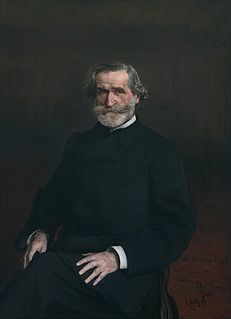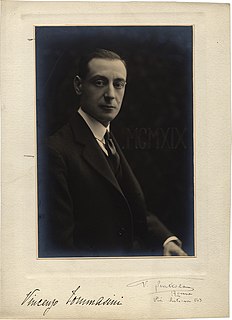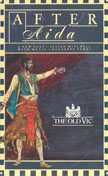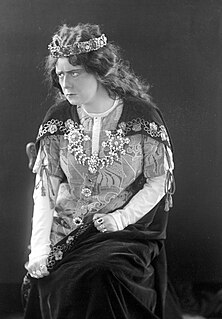
Giuseppe Fortunino Francesco Verdi was an Italian composer best known for his operas. He was born near Busseto to a provincial family of moderate means, receiving a musical education with the help of a local patron. Verdi came to dominate the Italian opera scene after the era of Gioachino Rossini, Gaetano Donizetti, and Vincenzo Bellini, whose works significantly influenced him.

In Greek mythology, Priam was the legendary and last king of Troy during the Trojan War. He was the son of Laomedon. His many children included notable characters such as Hector and Paris.

Falstaff is a comic opera in three acts by the Italian composer Giuseppe Verdi. The Italian-language libretto was adapted by Arrigo Boito from the play The Merry Wives of Windsor and scenes from Henry IV, Part 1 and Part 2, by William Shakespeare. The work premiered on 9 February 1893 at La Scala, Milan.

Otello is an opera in four acts by Giuseppe Verdi to an Italian libretto by Arrigo Boito, based on Shakespeare's play Othello. It was Verdi's penultimate opera, first performed at the Teatro alla Scala, Milan, on 5 February 1887.

Arrigo Boito was an Italian poet, journalist, novelist, librettist and composer, best known today for his libretti, especially those for Giuseppe Verdi's last two monumental operas Otello and Falstaff and his own opera Mefistofele. Along with Emilio Praga and his own brother Camillo Boito, he is regarded as one of the prominent representatives of the Scapigliatura artistic movement.
Mefistofele is an opera in a prologue and five acts, later reduced to four acts and an epilogue, the only completed opera with music by the Italian composer-librettist Arrigo Boito. The opera was given its premiere on 5 March 1868 at La Scala, Milan, under the baton of the composer, despite his lack of experience and skill as a conductor.

Simon Boccanegra is an opera with a prologue and three acts by Giuseppe Verdi to an Italian libretto by Francesco Maria Piave, based on the play Simón Bocanegra (1843) by Antonio García Gutiérrez, whose play El trovador had been the basis for Verdi's 1853 opera, Il trovatore.

Giulio Ricordi was an Italian editor and musician who joined the family firm, the Casa Ricordi music publishing house, in 1863, then run by his father, Tito, the son of the company's founder Giovanni Ricordi. Upon his father's death in 1888, Giulio became the head of the company until his death.

Camillo Boito was an Italian architect and engineer, and a noted art critic, art historian and novelist.

Francesco (Franco) Antonio Faccio was an Italian composer and conductor. Born in Verona, he studied music at the Milan Conservatory from 1855 where he was a pupil of Stefano Ronchetti-Monteviti and, as scholar William Ashbrook notes, "where he struck up a lifelong friendship with Arrigo Boito, two years his junior" and with whom he was to collaborate in many ways.

Amleto is an opera in four acts by Franco Faccio set to a libretto by Arrigo Boito, based on Shakespeare's play Hamlet. It premiered on 30 May 1865 at the Teatro Carlo Felice in Genoa and was revised for a La Scala production given on 12 February 1871.
Scapigliatura is the name of an artistic movement that developed in Italy after the Risorgimento period (1815–71). The movement included poets, writers, musicians, painters and sculptors. The term Scapigliatura is the Italian equivalent of the French "bohème" (bohemian), and "Scapigliato" literally means "unkempt" or "dishevelled". Most of these authors have never been translated into English, hence in most cases this entry cannot have and has no detailed references to specific sources from English books and publications. However, a list of sources from Italian academic studies of the subject is included, as is a list of the authors' main works in Italian.

Vincenzo Tommasini was an Italian composer.

Senso is a 1954 Italian historical melodrama film directed and co-written by Luchino Visconti, based on Camillo Boito's novella of the same name. Set during the Third Italian War of Independence, the film follows the Italian Contessa Livia Serpieri, who has an affair with the Austrian Lieutenant Franz Mahler.
Nerone (Nero) is an opera in four acts composed by Arrigo Boito, to a libretto in Italian written by the composer. The work is a series of scenes from Imperial Rome at the time of Emperor Nero depicting tensions between the Imperial religion and Christianity, and ends with the Great Fire of Rome. Boito died in 1918 before finishing the work.

Romilda Pantaleoni was an Italian soprano who had a prolific opera career in Italy during the 1870s and 1880s. She sang a wide repertoire that encompassed bel canto roles, Italian and French grand opera, verismo operas, and the German operas of Richard Wagner. She became particularly associated with the roles of Margherita in Boito's Mefistofele and the title role in Ponchielli's La Gioconda; two roles which she performed in opera houses throughout Italy. She is best remembered today for originating the roles of Desdemona in Giuseppe Verdi's Otello (1887) and Tigrana in Giacomo Puccini's Edgar (1889). Universally admired for her acting skills as well as her singing abilities, Pantaleoni was compared by several critics to the great Italian stage actress Eleonora Duse.

After Aida is a 1985 play-with-music by Julian Mitchell. It is about Giuseppe Verdi, and the pressure put upon him after his attempt to retire from composing. Continued insistent prodding from his friends eventually results in one of his greatest masterpieces, the opera Otello, which premiered in 1887.

The Casa di Riposo per Musicisti is a home for retired opera singers and musicians in Milan, northern Italy, founded by the Italian composer Giuseppe Verdi in 1896. The building was designed in the neo-Gothic style by Italian architect, Camillo Boito. Both Verdi and his wife, Giuseppina Strepponi are buried there. A documentary film about life in the Casa di Riposo, Il Bacio di Tosca, was made in 1984 by the Swiss director Daniel Schmid.

The Teatro Carignano is a theatre in Turin and one of the oldest and most important theatres in Italy. Designed by Benedetto Alfieri, it is located opposite the Palazzo Carignano. Building commenced in 1752 and the theatre was inaugurated the following year with a performance of Baldassare Galuppi's opera, Calamità de' cuori. Much of the theatre was destroyed in a fire in 1786, but it was rebuilt in a few months using Alfieri's original plans. Since then it has undergone several renovations. Although today it is primarily used for performances of plays, in the past it was an important opera house. The theatre is owned by the City of Turin but administered by the theatre company, Teatro Stabile di Torino, and is one of the company's principal performing venues.

Olivia (Liva) Järnefelt née Edström was a Swedish mezzo-soprano who specialized in opera. In 1897, after appearing at the Royal Swedish Opera as the Third Boy in Mozart's The Magic Flute and making her actual debut as Pantalis in Boito's Mefistofele, she remained with the company until 1926. She performed major roles in several Wagnerian operas as well as in a variety of Italian works. On the occasion of her 25th anniversary with the Royal Opera, she was enthusiastically acclaimed for her performance in the title role of Bizet's Carmen. Appreciated by both her audiences and her critics for her clear, full-bodied voice and her outstanding stagecraft, she was awarded the Litteris et Artibus in 1920.















